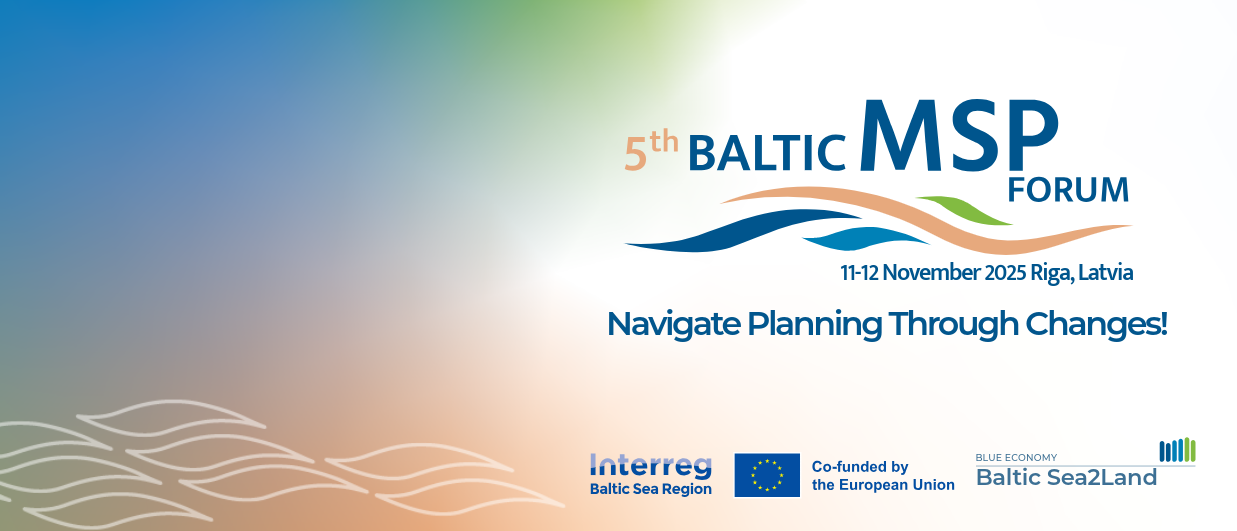Session 9 – Effective use of space for a sustainable blue economy: Baltic approaches to multi-use in marine and coastal areas
Session 9 – Effective Use of Space for a Sustainable Blue Economy: Baltic Approaches to Multi-Use in Marine and Coastal Areas
Taking place: 12 November 2025 10:45-12:00 EET
With growing spatial demands from offshore energy, marine nature protection, and maritime security sectors, clearly defined solutions to enable their co-existence through exclusive or multi-use option in sea space are needed.
Cross-sectoral coordination – both at sea and along the coast – is fundamental; for example, ports and coastal communities may find new opportunities through integrated land-sea planning for multi-use. The session will focus on how to manage overlapping spatial claims, reduce conflicts, and ultimately implement the Sustainable Blue Economy by making better, smarter use of shared marine and coastal space.
Why this session? Spatial efficiency helps balance competing interests and enables coexistence, supporting sustainable development. Multi-use solutions reduce single-use footprints and foster cross-sector synergies and innovations.
Session aim:To showcase practical solutions, existing planning and governance approaches, share lessons learned that support development towards spatial efficiency and multi-use in MSP.
This session will explore:
- How can the limited sea space be realized efficiently through MSP and other governance frameworks in the Baltic Sea Region?
- The session will draw on studies and experience from the EU, Nordics, North Sea and Baltic Sea
- What governance and planning approaches support more spatially efficient use of marine and coastal space?
- What lessons can be drawn from recent studies and practical experiences across the Baltic Sea Region (and beyond)?
- How can multi-use be effectively implemented to reduce spatial conflicts and foster coexistence across sectors and the land-sea interface?
SPEAKERS
- Welcome and moderation by Ivana Stojanovic, Submariner Network for Blue Growth
- Study on current and future possibilities for multi-use in the EEZ. Bettina Käppeler, Federal Maritime and Hydrographic Agency, Germany
- Green Energy Meets Blue Food – study on sustainable coexistence in Nordic seas. Kerstin Bly Joyce, Nordregio
- Maripark as a concept: one of NESB project’s Maripark pilot cases (North Sea / international). Kinnie De Beule, Blue Cluster
- Multi-use pilot cases from ULTFARMS. Alexander Ziemba, Deltares
Target audience:
MSP practitioners, local/regional/national policymakers, coastal planners, offshore/coastal infrastructure developers, port authorities, sectoral stakeholders, researchers, and others involved in marine and coastal spatial planning and Sustainable Blue Economy development
Lead organisers:
SUBMARINER Network for Blue Growth, VASAB
Keywords: Spatial efficiency, Integrated planning, Multi-use, Land-sea interactions, Multi-level governance, Cross-sectoral cooperation, Spatial conflict management, Coexistence, Maritime and coastal spatial planning, Sustainable blue economy
Session is organised by the NESB project partners. NESB project is co-funded by the European Union. Views and opinions expressed are however those of the project consortium only and do not necessarily reflect those of the European Union or CINEA. Neither the European Union nor the granting authority can be held responsible for them.

